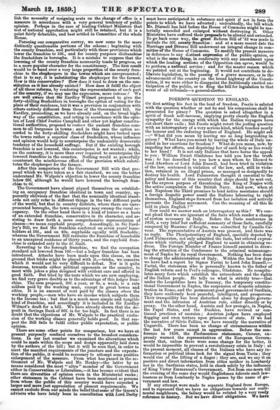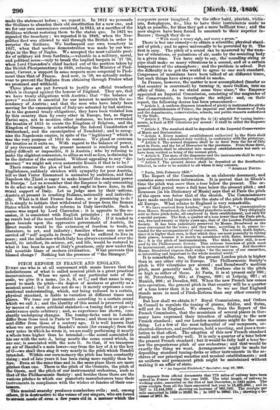POERIO'S QUESTION TO ENGLAND.
ON first setting his foot in the land of freedom, Poerio is saluted with the question whether or not he and his companions shall be prosecuted for piracy ? The question is asked altogether in a spirit of frank self-sarcasm, implying pretty clearly the English sympathy for the energy with which the Italian voyagers have cut short their exile ; but Poerio might retort the jesting question with an interrogatory of a very serious kind, which touches nearly the honour and the enduring welfare of England. He might as What did you mean by leaving me so long languishing in prison ? What have you meant by leaving the whole of Italy un- aided in her exertions for freedom ? What do you mean now, by impeding her efforts, and depriving her of such help as Les ready to her hand ? It is not only Italians that have borne the appeal to you : William Ewart Gladstone has told you how the truth was ; lie has described to you how a man whom he likened to Lord Aberdeen or Lord John Russell, had been tried in violation of the law, sentenced in violation of the law, and, still in viola- tion retained in an illegal prison, so managed as designedly to destroy his health. Lord Palmerston thought it essential to the policy and honour of this country that ships should be sent out, for the express purpose of threatening the King of Naples with the active compulsion of the British Navy. And now, when at last Napoleon the Third promises to lend active assistance should a foreign despotic power assail the Italians labouring to right themselves England steps forward from her isolation and actively prevents the Italian movement. Can the meaning of all this be told in plain English ? " Now could we answer such an interrogatory as this ? We can- not plead that we are ignorant of the facts which render a change of system necessary in Italy. Before the Paris conference in 1856, a very brief but sufficient summary of those facts, carefully composed by Massimo d'Azeglio, was submitted by Camillo Ca- your. The representative of Austria was present, and there was no reply. The Plenipotentiary of England, specially deputed by Lord Palmerston not only admitted the facts, but uttered expres- sions which virtually pledged England to assist in obtaining re- dress. The Foreign Minister of France himself assisted in draw- ing the attention of the Conference to the criminal mismanage- ment of Naples by its royal Government. Nothing has been done to change the administration of Italy. Within the last few days we have had a report by Signor Farini to Lord John Russell,— Farini, the statesman who is personally known to the father of English reform and to Peel's colleague, Gladstone. He recapitu- lates many facts which establish the antecedents and the rights of the Italian people. He tells us what is strictly true—that under the Leopoldme laws in Tuscany, the temporary constitu- tional Government in Naples, the suspension of despotic adminis- tration in Rome, and the permanent good government of Sardinia, they have uniformly been peaceful, intelligent, and prosperous. Their tranquillity has been disturbed alone by despotic govern- ment and the intrusion of Austrian rule, either directly or by proxy. On the other hand, Austria and her proteges, in Naples, the Papal States, and the Duchies, have revived or con- tinued practices of coercion ; Austrian judges have employed flogging and even torture upon prisoners of state. If we had the narrative of Silvio Pellico, we have recently the narrative of trngarelli. There has been no change of circumstances within the last few years except in aggravation. Before the con- ference in 1856, the Piedmontese statesman, Cavour, ex- pressly warned the representatives of the European Govern- ments that, unless there were some change for the better, it would be impossible to prevent a revolutionary crisis in Italy: at the present moment, all classes of the Italians who have any in- formation or political ideas look for the signal from Turin ; they would rise at the lifting of a finger ; they are and we say it on positive and direct information from cities neither in Lombardy nor in the Sardinian states, held in check solely by the influence of King Victor Emmanuel's Government. Not'km one morn till the evening of the same day would Englishmen tolerate finch law- lessness as from Lombardy to Naples passes by the name of go- vernment and law. If any attempt were made to separate England from Europe, and to represent that we have no obligations towards our conti- nental neighbours, the fallacy would be refuted by a very ready reference to history. But we have direct obligations. We have made the statement before ; we repeat it. fn 1812 we persnade the Sicilians to abandon their old constitution for a new one, and we for our own convenience connived, in 1815, at a sacrifice of the Sicilians without restoring them to the status quo. In 1821 we repeated the treachery ; we repeated it in 1849, when the Nea- politan fleet was allowed to sail through the British in order to surprise the Sicilians. We burlesqued our own treachery in 1857, when that useless demonstration was made by our war- ships in the Bay of Naples. We accepted the most valuable prof- fer of military aid from Sardinia,—valuable in a military, moral, and political sense—only to break the implied bargain in '57 '58, when Lord Clarendon's .chief backed out of the position taken by the British Plenipotentiary in 1856, refusing the Minister of Pied- mont, Callum, a support in some respects more congenial to Pied- mont than that of Prance. And now, in '59, we actually endea- vour to prevent the Italians from obtaining through France what we promised and withhold. Three pleas are put forward to justify an official treachery which is charged against the honour of England. They are, that we have treaty obligations with Austria; that "the balance of power" renders it essential for our interest to maintain the as- cendancy of Austria; and that the men who have lately been moving for the emancipation of Italy are actuated by bad motives. As to the general treaty obligations, they have been violated less 1:ff this country than by every other in Europe, but, as Signor Farini says, not to mention other instances we have overruled the treaties of 1815 to create the Kingdom of Belgium, and the Kingdom of Greece; to acknowledge the federal Constitution of Switzerland, and the emancipation of Neuchatel; and to recog- nise the Napoleonic empire, in spite of the " legitimacy " which it was the very purpose of 1815 to restore. We plead or contemn the treaties as it suits 118. With regard to the balance of power, if any Government at the present moment is rendering such a policy difficult or impossible, it is Austria ; who by refusing to make the slightest concession, to allies as well as foes, is claiming to be the dictator of the continent. Without appealing to any " de- mocracy " we might ask even autocratic Russia if that is to be ? There remains the plea of bad motives. Some over cautious Englishmen, suddenly stricken with sympathy for poor. Austria, tell us that Victor Emmanuel is animated by ambition, and that Napoleon the laird is eager to make himself the dominant power in Euro ■p-. c Let us remember that the Emperor is only eonsenting to de -what we might have done, and ought to have done in the moral support of Italy. Let us judge men by their .itotions. -Austria at present is crushing Italians, nationally and individu- ally. What is it that France has done, or is promising to do ? It is simply to initiate that withdrawal of troops from the Roman States which would render reforms in Italy inevitable. Such a course was urged by Lord Clarendon ; it is apposite to the oc- casion, it is consistent with English principles ; it could have no result but of the most beneficial kind in Italy. If it tended to place bounds upon the oppressive government of Austria its direct results would be the extension of freedom to trade, to literature, to art, and industry ; families whose sons are now carried off "coil' aoquila in fronte " would be suffered to live in peace ; and the influence which Italy has always exercised over the world, its intellect, its science art, and life, would be restored to what it has been in ages of Italy's greatness, only now under the full noontide blase of modern civilization. What prevents this blessed change ? Nothing but the presence of "the Stranger."



























 Previous page
Previous page